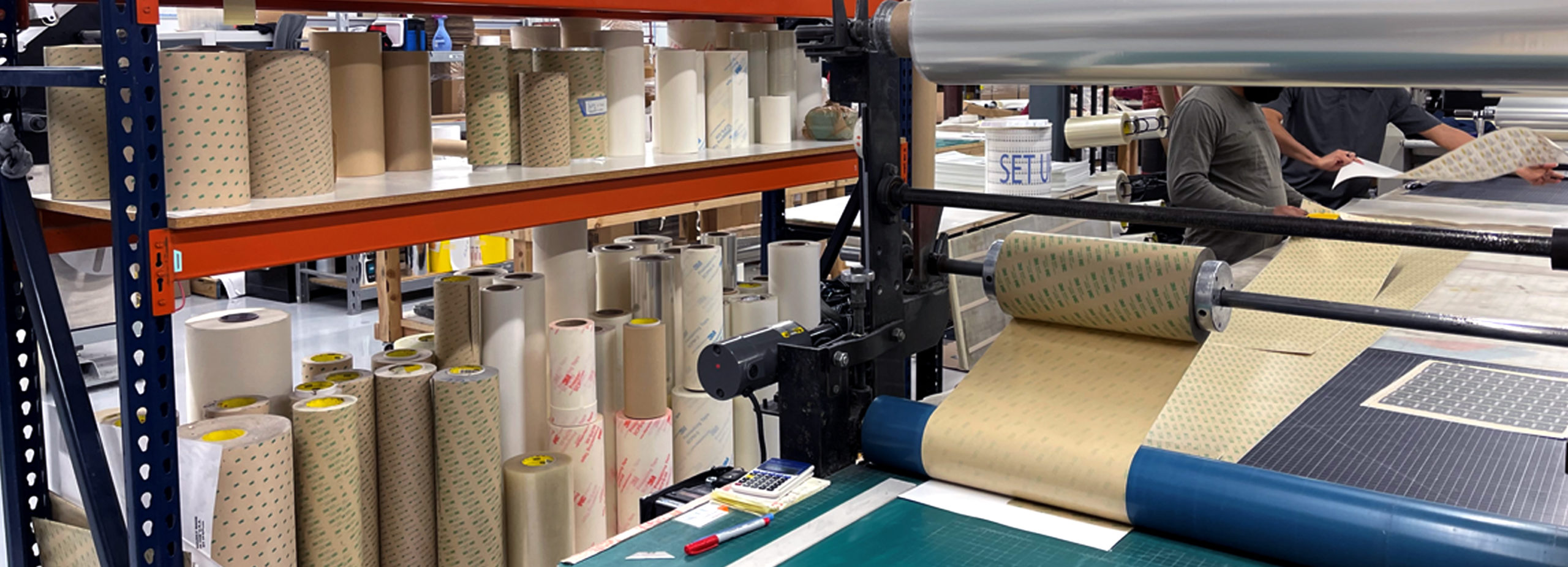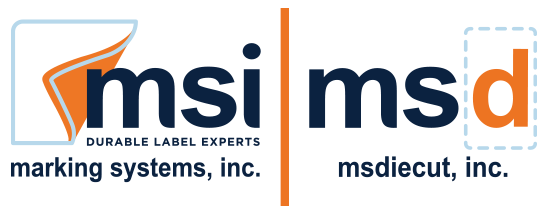MSI and MSD FAQs

At Marking Systems, we're one of only five printing companies in the U.S. granted a 3M Preferred Converter distinction and the only one that is also a Preferred Die-Cutter, thanks to our sister company, MSD. We're your one-stop shop!
As you might imagine, we get a lot of common questions about both facets of our business, MSI and MDS. Here's what you need to know.
MSI FAQs
Can you provide an adhesive that will stick to a powder coat surface?
Yes, we can! We would use a 3M 300LSE Low Surface Energy Acrylic Adhesive. This adhesive family has good chemical and humidity resistance. It also provides outstanding adhesion to low surface energy plastics, powder coated paints and lightly oiled metals. Other properties:
- The 3M 300LSE adhesives are typically known as 3M 9471LE, which is a 2 mil, or 3M 9472LE, which is a 5 mil.
- .002 thick adhesives are designed for smooth or slightly textured surfaces
- .005 thick adhesives are designed for medium to heavily textured surfaces
My label is falling off! Can you help?
No problem for our team at MSI. Give us a call today so we can understand the full scope of the project and help you determine the correct adhesive for the application.
In order to determine the best material and adhesive we would ask these questions:
- What surface is the label being applied to?
- Will the label be exposed to any chemicals or harsh agents?
- Will the label be indoors or outdoors?
- Do you need a permanent bond or removability?
Do you have labels that withstand chemicals and cleaning?
Yes, depending on the types of chemicals, we would recommend a few different options. Most recommended would be a polyester material with a polyester laminate or a subsurface printed polyester. Polyester materials are more resistant to abrasion, scratching, solvents and chemicals than polycarbonates.
Do you have labels that can go outdoors?
Absolutely! Depending on the type of label you are looking for and the application, we can recommend a few different options for outdoor labels.
- UV polycarbonate
- UV polyester laminate
- Autotex UV Polyester
- 3M 7 year vinyl laminated with a UV 7 year clear coat
Contact us today to determine the best solution for your application.
Can you provide labels that we can thermal print in house?
Yes! MSI can provide custom shapes, sizes, colors or pre-printed thermal printable labels. Our R&D Manager is a thermal printer expert on material, ribbon and equipment. He can consult with our customers onsite. Check out our case study, which gives more information on how we helped our customer set up a thermal printer in house.
What are your tolerances?
Tolerances are +/- 0.010: print to print, print to cut and die cutting. We can hold tolerances of +/- 0.05 if specified. This may require additional costs but is doable.
Can you color match to my plastic bezel?
Yes! Check out our Color Matching page here! https://markingsystems.com/durable-label-capabilities/color-matching/
Do you have UL/CSA labels?
MSI has worked with UL and CSA since 1975. We can help with a number of UL certifications.
- PGDQ2
- PGJI2
- PGGU2-UL
- PGIS
How does a Dead Front label work?
A dead front label refers to an icon or feature that is hidden from view until an LED light illuminates the symbol or text. We use a layer of transparent ink that allows the light to go through the symbol or text when the LED is on. In addition, we use a light blocker on the rest of the label to keep the light from bleeding through anywhere else but the desired symbol or text. Check out this blog for more info.
What kind of printing do you do?
That's a long answer! See here for more info - https://markingsystems.com/durable-label-capabilities/label-printing/
MSD FAQs
What is the largest part you can die cut?
We have die cutting presses that can cut parts as wide as 42”. For lower volume parts, we have other equipment that can cut parts as wide as 60”.
Do you have adhesives that will bond to injection molded plastic?
Yes! Injection molded plastics are notoriously difficult to bond to since they are a low surface energy substrate. Depending on what you are trying to bond, we have a wide variety of adhesives that are specially engineered to work with these materials. For help choosing an adhesive, reach out to your sales rep and request a meeting with our R&D Manager. https://markingsystems.com/contact/
Do you have gasket materials that will withstand high temperatures?
Yes! When choosing a high temperature gasketing material, the most critical information is the maximum operating temperature you expect your product to withstand. Silicone foam or rubber are a great choice for high temperature applications, but they are not always necessary. Before you choose a material, reach out to your sales rep to schedule a consultation with our R&D Manager to discuss your options.
I’m looking for a custom solution to eliminate mechanical fasteners from my assembly. What would you recommend?
This is a frequent request we receive from OEMs looking at options to reduce device weight and increase productivity on their production line. Thanks to recent advances in material development, many mechanical fasteners and even welds can now be reduced or eliminated and replaced by custom die cut VHB structural adhesives or hook & loop fasteners. Call and schedule a meeting with our R&D Manager to discuss what options might be right for you! https://markingsystems.com/contact/
Why do some gaskets take a permanent impression after being compressed?
This is called compression set. When you look at a closed cell foam under a microscope, you will see a structure of cells – think bubble wrap. Every time you compress the foam, it crushes some of that cell structure and causes some of the cells to rupture. This means over time, your number of remaining cells reduces, and your material no longer fully rebounds to the original thickness. This eventually will result in that gasket no longer providing an adequate seal. If you are concerned about compression set, schedule a call with our R&D Manager to discuss material options to increase the life of your gaskets.
I’m trying to bond two dissimilar substrates. What type of adhesive should I use?
Adhesives are engineered to bond very well with a particular type of surface. But when you need to bond two very different surfaces, you can run into problems. One option is a differential double coat adhesive. This adhesive has a PET carrier with a different adhesive on each side. Another option is our proprietary priming process. If you are trying to bond an acrylic adhesive to certain difficult-to-bond materials, like silicone, we can prime the material, which allows us to bond an adhesive that normally would not work with that material.
Are you willing to take blanket orders and hold parts to release to us as needed?
Yes! Blanket purchase orders or finished goods contracts are always an option we are willing to consider for our larger customers. This allows us to purchase raw material in bulk and run 6-12 months’ worth of parts all at once, then release to you as needed. We are then able to pass on cost savings to you while only requiring you to pay for parts as they are shipped, as long as you take the full amount of the contract by the expiration date.
I’m trying to minimize EMI/RFI interference in my device. Do you have products to help with this?
EMI/RFI interference issues can be tricky, and there are a number of foam and adhesive foil products that can help isolate and minimize them. If you are trying to fix an interference issue in your device, let our experts help you choose the right product for your specific application.
https://markingsystems.com/contact/
What is the difference between a double coat adhesive and a transfer tape?
A double coat adhesive is made up of a thin PET carrier with adhesive coated on both sides. A transfer tape is pure adhesive with no carrier. Transfer tapes tend to have a higher initial tack level and flow better into uneven surfaces, but they are not ideal for use with gaskets, since they can stretch. If you are choosing an adhesive to use on one or both sides of a gasket made from foam or another elastomeric material, you should choose a double coat adhesive. The PET carrier keeps the adhesive from stretching, which gives the entire gasket better dimensional stability. This makes application easier and helps produce uniform results in your assembly process.

